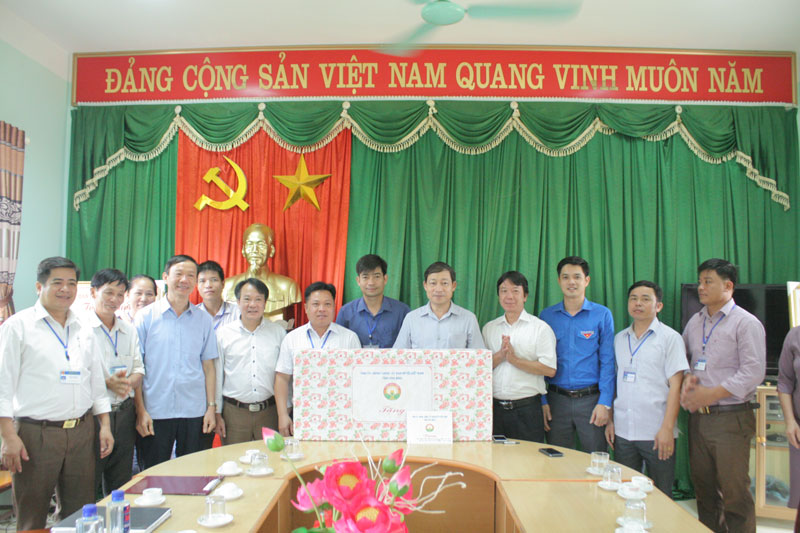
(HBO) – A delegation of Hoa Binh province led by Vice Chairman of the provincial People’s Committee Bui Van Cuu on August 28 visited and presented gifts to residents in the Muong Khoi revolutionary base in Lac Son district ahead of the country’s 73rd National Day (Sept. 2)

Vice
Chairman of the provincial People’s Committee Bui Van Cuu and leaders of
departments, sectors and Lac Son district present gifts to the administration
and residents of An Nghia commune.
The Muong Khoi resistance base was one of the
cradles of the revolutionary movement in Hoa Binh. It was the training site for
revolutionary cadres and militia and also the venue of concentrated military
classes of the former Party Committee of the northern region. In the August
Revolution in 1945, the militia of the Muong Khoi resistance base joined local
residents to fight and seize power.
In 1993, Muong Khoi was named a national
revolutionary historical relic site by the then Ministry of Culture and Sports.
In An Nghia commune, the delegation offered incense at the
monument to heroic martyrs and visited the exhibition hall of the Muong Khoi
resistance base. Later, they visited and presented gifted to local authorities
and people.
Over the past years, the Party Organisation,
administration and residents of the commune have weathered difficulties to
boost socio-economic development. The provincial People’s Committee recognised
An Nghia as a new-style rural commune in 2017.
Vice Chairman of the provincial People’s
Committee Bui Van Cuu applauded the achievements An Nghia has obtained,
stressing that aside from developing the economy, local authorities also need
to pay attention to curbing negative phenomena and crimes, promoting the
movement of all people building the civilized lifestyle, and improve the
quality of their new-style rural area status./.
Hoa Binh province is undergoing a dynamic transformation amid Vietnam’s national digital transition. Building on Poliburo’s Resolution No. 57-NQ/TW on breakthroughs in science, technology, innovation, and national digital transformation, the province has rolled out a wide range of practical action plans. A standout initiative is the "Digital Literacy for All” movement, an effort to ensure that no one is left behind in the digital era.
Hoa Binh province is undergoing a dynamic transformation in the wake of the national digital transformation movement. Building on Resolution No. 57-NQ/TW of the Politburo on breakthroughs in science, technology, innovation, and national digital transformation, the province has implemented a wide range of practical action plans. A standout initiative is the "Digital Literacy for All” movement ambitious effort to ensure that no one is left behind in the digital age.
With a spirit of unity and proactive problem-solving, the Party Committee, the government and the people of Dong Lai Commune (Tan Lac District) have made great strides in implementing the resolutions of the 24th Party Congress of the commune for the 2020 - 2025 term. Focusing on leadership and practical actions, the commune has brought the Party’s resolutions into daily life, creating strong impacts and pushing the local development forward.
Amid the nationwide push for digital transformation, young people in Hoa Binh Province are stepping up as dynamic pioneers, applying technology to enhance Youth Union operations and expand the reach of youth-led initiatives. Through creativity and adaptability, Youth Union organizations at all levels have introduced a series of practical solutions, contributing to modern governance and community development.
In recent years, An Nghia commune, located in Lac Son district, has stepped up administrative reform, focusing on improving the quality and efficiency of its single-window service unit for receiving and processing administrative procedures. These improvements have helped create favourable conditions for local residents and organisations to handle administrative procedures, contributing to the commune’s broader socio-economic development.
The Prime Minister-approved master plan to develop the multi-use value of forests ecosystems through 2030, with a vision to 2050, aims to improve the management and sustainable use of forest resources, create jobs, increase incomes, and improve the living standards of ethnic minorities, people in mountainous and remote areas, forest workers and those living near forests.



